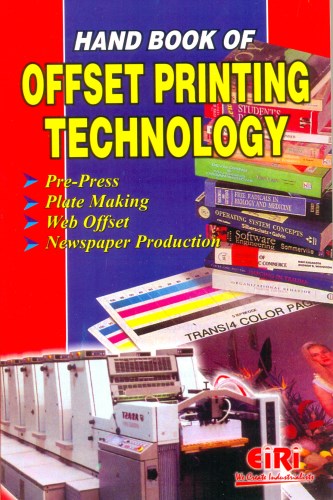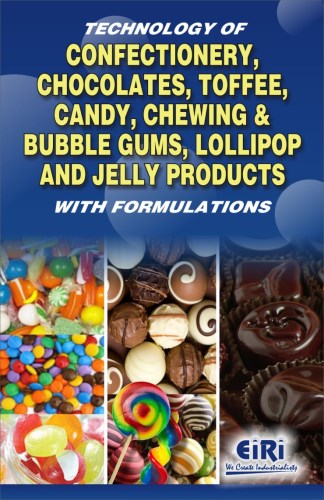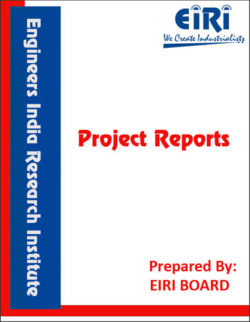Description
HAND BOOK OF OFFSET PRINTING TECHNOLOGY
COMPOSING THE TYPE
How to Set Foundry Type
Select the type
Adjust the composing Stick To the desired Measure
Cut Leads and Slugs to Length
Set the Type
Prepare A Reproduction Proof
Machine set Hot Type
How to Prepare A Reproduction Proof
Dump the type
Space out the form
Tie up the form Proof the type for ErrorsPull the Reproduction Proof
Distributed The Type
Cold Type Composition
Hand Assembling Preprinted Letters
How to Set Dry Transfer Type
Position the first letter
Transfer the first letter
Transfer the Remaining Letters
Make Corrections as Required
Burnish The Type
Protect the copy
How to set Pressure Sensitive type
How to set type from Paper type pads
Assemble Characters in the composing stick
Remove type from the composing stick
Trim type to size
Typing with a Typewriter
Phototypesetting
How to set type with a strip printer
Insert a filmstrip
Expose the first character
Expose the remaining characters
Process the film or Paper
How to set type with a Headliner
Position the type Master and set the controls
Set the type
DESKTOP PUBLISHING (SOFTWARE)
What is DTP
An Unusual application
It is Possible with desktop publishing
At the Press of A Button
And within A Few Minutes 800 Catalogue Pages
Problems Exist with Hardware too
How this Book Was Created
Printing up to Now
Layout Planning by The Designer
The Typesetting Studio Recreates the Text
The Galley Proofs Are Corrected By the Author
The Author Has to shorten texts which are too long
Imposition Planning
Final Control By Author
Any Other Requests
The Litho is created
Printing Preparation
Printing Today with DTP
DTP simple
What Does a DTP Process Look Like
Creation of Text
Obtaining Pictures
Layout
Sample Print
Inexpensive Printing
Professional Printing
The Advantage
Comparison of the conventional system with DTP
THE POSTSCRIPT LANGUAGE
Image
The Printer Driver
Postscript Errors
Postscript Limitations
PROOF READING
PRE-PRESS PROCESSES
Computer Generated Screens
CAMERA
Process Cameras
Camera Size
Camera Optics
Choice of Camera Type
Vertical Cameras
Horizontal Cameras
State of the Art Cameras
Contact Exposure Facility
Vacuum Contact Frame
Contact Exposure System
Exposure Control Systems
Image Distortion
Lith Developers
Chemical Mixing
Colour Electronic prepress systems
Computer Aided Design (CAD)
Image Capture Systems
Image Assembly and Image Manipulation Systems
Rules or Borders
Illustrative Copy
Continuous Tone Copy
Photograph and Illustration
Combination Copy, Continuous Tone & Line
Mechanical Copy Assembly
Image Assembly for Reproduction
Stripping Substrates
PHOTOGRAPHING LINE & CONTINUOUS TONE COPY
Steps to Expose A Line Negative
Photographing Colored copy
Screen Color
Negative & Positive Screens
Screen Rulings
Dot Shape
Special Effect Screens
Halftone Negative
Half Tone Exposures
Filter Factors
Steps to Process Line & Halftone Negatives
Prepare the chemicals
Prepare The Darkroom
Develop the Negative
Stop The Action of The Developer
Fix the Film
Wash The Film
Dry the Film
Machine Processing of Lines & Halftone Negatives
Advantages of Machine Processing
Contact Printing
Contacting Equipment
Stripping & Proofing Flat
Etching & Opaquing
Stripping Positive Flats
Stripping Halftones
Registration Techniques
Step & Repeat Flats
SCANNING
Scanner Resolution
Sharpness
White Point Adjustment
Black Point Adjustment Gradation
Colour Adjustments Preparation
Scanner Workflow
OFFSET PLATE MAKING
Plate & Platemaking
Graining
Anodizing
Coating
Prepare A Presensitized Plate
Desensitize
Lacquer
Wash
Develop
Squeeze
Wash
Finish
Print or Gum The Plate
Negatives
Positives
Inking in
Automatic Plate Processors
Make a Series of Test Exposure
Process The Test Strips
Compare the results to a standard
Platemaking Exposure Factors
Multimetal Plates
Waterless Plates
Thermal Hardening
Types of Offset Plates
Direct Image Plates
Presensitized Plates (PS Plates)
To Prepare A PS. Plate
Desensitize
To Prepare Wipe on plates
Expose a Paper Negative
Transfer the Unexposed silver from the negative to the plate
Process the plate
Electrostatic Plates
Photo Direct Plates
Step & Repeat Platemaking
Platemaking Procedures
PRESSES
Letter Press
The Offset Process and Its Principle, Advantage and Limitations
Lithography Offset
Presses (Offset) or Duplicators
Perfector & Multicolour Presses
OFFSET PRESS
Sheet Feeder
Sheet Separator
Printing Units
Plate Cylinder
Inspect and Measure The Plate
Blanket Cylinders
The Inking System
The Damping System
No Covering
Brush Damping
Cotton Covers
Paper Damper
Stockkinette Sleeves
3M Paper Sleeves
Dampening Solutions
The Autodamp Unit
Brush Damping Unit
The Hydro Colour System
Condensation Damping Unit
The Dahlgran Unit
Matic Damping Unit
Feeding & Registering System
Sheet, Stream and Web Fed Presses
The Delivery System
Pre Make Ready Check List
Make Ready Check List
Clean Up Check List
Two Colour and Multi colour sheet Fed Presses Cylinder Arrangements
Mabeg Feeder
Setting Instructions
Pile Loading
Pile Raising
Sheet Separator Unit
Pick Up Suckers
Rear Air Blast Nozzles
Rear Flip Brushes
Setting Transport Rollers
Adjusting the hold down Rollers
Adjusting The Hold Down Rollers
Setting Plastic Transport Rollers
Adjustment of Rotary Brushes
Adjusting The Sheet Hold Down Balls
Setting Flat Brushes
Adjusting the Double Sheet Control
Recheck of Double sheet control
Front and Side Lays
Swing Arm Grippers
Sheet Detection
Sheet Transport
The Delivery System
Panels Control
Press Makeready and Operation
Checking The work Instruction
Preparing The Pile
Feeder Setting
Feedboard Setting
Setting the sheet Path
Delivery Setting
Fitting The Plate
Preparing the Dampers
Ink Preparation
Electrostatic Powder Application
Washing Off the Plate
Printing
Setting Register Controls
Obtaining the Pass Sheet and Running on
Wash Up
Plate Cylinder Packing
Change of Image Size
Impression Cylinder Pressure
Hydraulic Triping
Blanket Maintenance
Multicolour Printing
Image Coverage
Ink Transparency
Ink Colour
Process Colour Printing
The Multicolour Press
Quality Control
WEB OFFSET
Cylinder Dimensions
Plate Cylinders
Blanket Cylinders
Impression Cylinders
Inking System
Damping will
Photo Polymer Relief Printing
Photopolymer Relief Plates
Solid Plates
Proofing
Web Offset
Newspaper Printing
Length Folding
Cross Folding
Concertina Folding
Combination Folding
Ribbon Folding
Cutting
Rewinding
Infra Red Drying On Web Offset
Offset Printing Machines
Durometer
Anti Set Off Spray Powder Control
Pressroom Lighting
Moisture Content of Paper
Business Form Production
SPECIFICATIONS FOR OFFSET PUBLICATIONS
Standard Specifications for Offset Publications
Density and dot Gain on coated Papers
Solid Density on Coated Paper
% Dot Gain and Tolerances on Coated Paper
Density and Dot Gain on Glazed Newsprint
%Dot Gain and Tolerances on Coated Paper
Screen Angles
Colour Sequences
Ink Quality and Colour
Proofing Specifications
Proofing Paper
Set of Positives
Colour Sequences & Ink Shades
Proofing Densities & Dot Gains
Progressive Proofs
Control Strips
Markings
Viewing Conditions
Photo Mechanical Pre Press Proofing
Ink Trapping
PROOF AND PROOFING TECHNIQUES
Simple Proofs
Colour Proofing
Colour Sequence
Film Laminates
Pigment/Toner Laminates
Ink on Paper
Ink Jet Proofs
Video Proofs
Electrostatic
Proofing
Digital Proofs
Advantages and Uses of Different Proofing Methods
Digital Proofs Advantages
Use This Method When
Use This Method When
Photomechanical Proofs Advantages
Use This Method When
Press Proofs advantages
Use This Method When
Proof Correction Symbols
NEWSPAPER PRINTING: LETTERPRESS, OFFSET, FLEXO AND ANILOX
The Rapid Rate of Progress in Newspaper Printing During The Past Few
Decades will Continue into the future
Revolution in the Press Hall Offset Storms the Letterpress stronghold
Tailor Made Technology is the trend of today
Advanced Console Technology is Now Standard Equipment
Electronics can tap enormous productivity reserves
Counter trend towards Less complex Technology
The Newspaper Technology of tomarrow
Anilox offset
Dampening unit
Press configurations
Waterless offset printing for sheet fed & Web Fed
Silicone Instead of Aluminium
Best Results with Temperature Control
Temperature Control of The Inking Units
Start up waste in web offset Reduced
Using Synergism
Waterless Technology for Heat set presses
Active Air Cooling
The Secret of the waterless Process
NEWSPAPER PRODUCTION TECHNOLOGY
Page Forms
Page Grid
Creating A Story Hole on the Page Grid
Auto Registration
Composing Story Elements
Composing the complete story
Boxed Story
Rules Between Stories and over/underline for story Elements
Meta Editing
Advertisements
Yellow Page Software
Features
Parameter file Maintenance
Advertisements size file maintenance
Area Master file Maintenance
ategory master file maintenance
Salesman Master file Maintenance
PLANT ECONOMICS OF OFFSET PRINTING PRESS
Plant & Machinery
Fixed Capital
Raw Materials
Total Working Capital/Month
Total Capital Investment
Turn over/Annum
PLANT ECONOMICS OF DTP AND PRINTING UNIT
Plant & Machinery
Fixed Capital
Raw Materials
Total Working Capital/Month
Total Capital Investment
Turn over/Annum
PLANT ECONOMICS OF OFFSET SECURITY PRINTING PRESS
Plant & Machinery
Fixed Capital
Raw Materials
Total Working Capital/Month
Total Capital Investment
Turn over/Annum
SUPPLIERS OF PLANT & MACHINERIES
Offset Printing Machinery
SUPPLIERS OF RAW MATERIALS
Printing Chemicals
Printing Inks
Flexographic Printing Inks
Lithographic Printing Inks
Printing Plates
Engineers India Research Institute (EIRI) is a renowned name in the industrial world for offering technical and financial consultancy services.
EIRI services are:
Detailed Feasibility Reports
New Project Identification
Project Feasibility and Market Study
Identification of Lucrative Industrial Project Opportunities
Preparation of Project Profiles / Pre-Investment and Detailed Feasibility Studies,
Market Surveys / Studies, Market Survey Cum Detailed Techno-Economic Feasibility Reports
Project Reports in CD Roms
Identification of Plant /Process/Machinery and Equipment, Industrial General Guidance for setting up new industrial projects.
Our most up-to-date and Technologically Advanced Industrial Project Reports, categorized with respect to Financial Outlays and Sector – wise Classification are immensely useful for :
Existing Small or Medium Scale Industrialists facing competition from large houses
Young Entrepreneurs dreaming to start their own industrial enterprise
Young Graduates and Professionals wishing to begin their career
Industrialists interested in Debottlenecking their capacities & New Product – Lines
Large Industrial Houses pursuing Expansion, Growth and Diversification Plans






